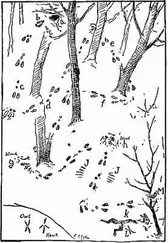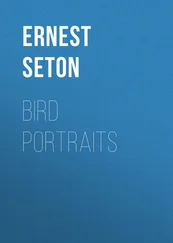Ernest Seton - Johnny Bear
Здесь есть возможность читать онлайн «Ernest Seton - Johnny Bear» весь текст электронной книги совершенно бесплатно (целиком полную версию без сокращений). В некоторых случаях можно слушать аудио, скачать через торрент в формате fb2 и присутствует краткое содержание. Жанр: Природа и животные, на английском языке. Описание произведения, (предисловие) а так же отзывы посетителей доступны на портале библиотеки ЛибКат.
- Название:Johnny Bear
- Автор:
- Жанр:
- Год:неизвестен
- ISBN:нет данных
- Рейтинг книги:3 / 5. Голосов: 1
-
Избранное:Добавить в избранное
- Отзывы:
-
Ваша оценка:
- 60
- 1
- 2
- 3
- 4
- 5
Johnny Bear: краткое содержание, описание и аннотация
Предлагаем к чтению аннотацию, описание, краткое содержание или предисловие (зависит от того, что написал сам автор книги «Johnny Bear»). Если вы не нашли необходимую информацию о книге — напишите в комментариях, мы постараемся отыскать её.
Johnny Bear — читать онлайн бесплатно полную книгу (весь текст) целиком
Ниже представлен текст книги, разбитый по страницам. Система сохранения места последней прочитанной страницы, позволяет с удобством читать онлайн бесплатно книгу «Johnny Bear», без необходимости каждый раз заново искать на чём Вы остановились. Поставьте закладку, и сможете в любой момент перейти на страницу, на которой закончили чтение.
Интервал:
Закладка:
The little hollow west of Chimney Butte was freshly grassed. The dangerous-looking Spanish bayonets, that through the bygone winter had waged war with all things, now sent out their contribution to the peaceful triumph of the spring, in flowers that have stirred even the chilly scientists to name them Gloriosa ; and the cactus, poisonous, most reptilian of herbs, surprised the world with a splendid bloom as little like itself as the pearl is like its mother shell-fish. The sage and the greasewood lent their gold, and the sand-anemone tinged the Badland hills like bluish snow; and in the air and earth and hills on every hand was felt the fecund promise of the spring. This was the end of the winter famine, the beginning of the summer feast, and this I was the time by the All-mother, ordained when first the little Coyotes should see the light of day.
A mother does not have to learn to love her helpless, squirming brood. They bring the love with them—not much or little, not measurable, but perfect love. And in that dimly lighted warm abode she fondled them and licked them and cuddled them with heartful warmth of tenderness, that was as much a new epoch in her life as in theirs.
But the pleasure of loving them was measured in the same measure as anxiety for their safety. In bygone days her care had been mainly for herself. All she had learned in her strange puppyhood, all she had picked up since, was bent to the main idea of self-preservation. Now she was ousted from her own affections by her brood. Her chief care was to keep their home concealed, and this was not very hard at first, for she left them only when she must, to supply her own wants.
She came and went with great care, and only after spying well the land so that none should see and find the place of her treasure. If it were possible for the little ones' idea of their mother and the cow-boys' idea to be set side by side they would be found to have nothing in common, though both were right in their point of view. The ranchmen knew the Coyote only as a pair of despicable, cruel jaws, borne around on tireless legs, steered by incredible cunning, and leaving behind a track of destruction. The little ones knew her as a loving, gentle, all-powerful guardian. For them her breast was soft and warm and infinitely tender. She fed and warmed them, she was their wise and watchful keeper. She was always at hand with food when they hungered, with wisdom to foil the cunning of their foes, and with a heart of courage tried to crown her well-laid plans for them with uniform success.
A baby Coyote is a shapeless, senseless, wriggling, and—to every one but its mother—a most uninteresting little lump. But after its eyes are open, after it has developed its legs, after it has learned to play in the sun with its brothers, or run at the gentle call of its mother when she brings home game for it to feed on, the baby Coyote becomes one of the cutest, dearest little rascals on earth. And when the nine that made up Coyotito's brood had reached this stage, it did not require the glamour of motherhood to make them objects of the greatest interest.
The summer was now on. The little ones were beginning to eat flesh-meat, and Tito, with some assistance from Saddleback, was kept busy to supply both themselves and the brood. Sometimes she brought them a Prairie-dog, at other times she would come home with a whole bunch of Gophers and Mice in her jaws; and once or twice, by the clever trick of relay-chasing, she succeeded in getting one of the big Northern Jack-rabbits for the little folks at home.
After they had feasted they would lie around in the sun for a time. Tito would mount guard on a bank and scan the earth and air with her keen, brassy eye, lest any dangerous foe should find their happy valley; and the merry pups played little games of tag, or chased the Butterflies, or had apparently desperate encounters with each other, or tore and worried the bones and feathers that now lay about the threshold of the home. One, the least, for there is usually a runt, stayed near the mother and climbed on her back or pulled at her tail. They made a lovely picture as they played, and the wrestling group in the middle seemed the focus of it all at first; but a keener, later look would have rested on the mother, quiet, watchful, not without anxiety, but, above all, with a face full of motherly tenderness. Oh, she was so proud and happy, and she would sit there and watch them and silently love them till it was time to go home, or until some sign of distant danger showed. Then, with a low growl, she gave the signal, and all disappeared from sight in a twinkling, after which she would set off to meet and turn the danger, or go on a fresh hunt for food.
IX.
Oliver Jake had several plans for making a fortune, but each in turn was abandoned as soon as he found that it meant work. At one time or other most men of this kind see the chance of their lives in a poultry-farm. They cherish the idea that somehow the poultry do all the work. And without troubling himself about the details, Jake devoted an unexpected windfall to the purchase of a dozen Turkeys for his latest scheme. The Turkeys were duly housed in one end of Jake's shanty, so as to be well guarded, and for a couple of days were the object of absorbing interest, and had the best of care—too much, really. But Jake's ardour waned about the third day; then the recurrent necessity for long celebrations at Medora, and the ancient allurements of idle hours spent lying on the tops of sunny buttes and of days spent sponging on the hospitality of distant ranches, swept away the last pretence of attention to his poultry-farm. The Turkeys were utterly neglected—left to forage for themselves; and each time that Jake returned to his uninviting shanty, after a few days' absence, he found fewer birds, till at last none but the old Gobbler was left.
Jake cared little about the loss, but was filled with indignation against the thief.
He was now installed as wolver to the Broadarrow outfit. That is, he was supplied with poison, traps, and Horses, and was also entitled to all he could make out of Wolf bounties. A reliable man would have gotten pay in addition, for the ranchmen are generous, but Jake was not reliable.
Every wolver knows, of course, that his business naturally drops into several well-marked periods.
In the late whiter and early spring—the love-season—the Hounds will not hunt a She-wolf. They will quit the trail of a He-wolf at this time —to take up that of a She-wolf, but when they do overtake her, they, for some sentimental reason, invariably let her go in peace. In August and September the young Coyotes and Wolves are just beginning to run alone, and they are then easily trapped and poisoned. A month or so later the survivors have learned how to take care of themselves, but in the early summer the wolver knows that there are dens full of little ones all through the hills. Each den has from five to fifteen pups, and the only difficulty is to know the whereabouts of these family homes.
One way of finding the dens is to watch from some tall butte for a Coyote carrying food to its brood. As this kind of wolving involved much lying still, it suited Jake very well. So, equipped with a Broadarrow arrow Horse and the boss's field-glasses, he put in week after week at den-hunting—that is, lying asleep in some possible look-out, with an occasional glance over the country when it seemed easier to do that than to lie still.
The Coyotes had learned to avoid the open. They generally went homeward along the sheltered hollows; but this was not always possible, and one day, while exercising his arduous profession in the country west of Chimney Butte, Jake's glasses and glance fell by chance on a dark spot which moved along an open hillside. It was grey, and it looked like this: and even Jake knew that that meant Coyote. If it had been a grey Wolf it would have been so: with tail up. A Fox would have looked so: the large ears and tail and the yellow colour would have marked it. And a Deer would have looked so: That dark shade from the front end meant something in his mouth—probably something being carried home—and that would mean a den of little ones.
Читать дальшеИнтервал:
Закладка:
Похожие книги на «Johnny Bear»
Представляем Вашему вниманию похожие книги на «Johnny Bear» списком для выбора. Мы отобрали схожую по названию и смыслу литературу в надежде предоставить читателям больше вариантов отыскать новые, интересные, ещё непрочитанные произведения.
Обсуждение, отзывы о книге «Johnny Bear» и просто собственные мнения читателей. Оставьте ваши комментарии, напишите, что Вы думаете о произведении, его смысле или главных героях. Укажите что конкретно понравилось, а что нет, и почему Вы так считаете.




